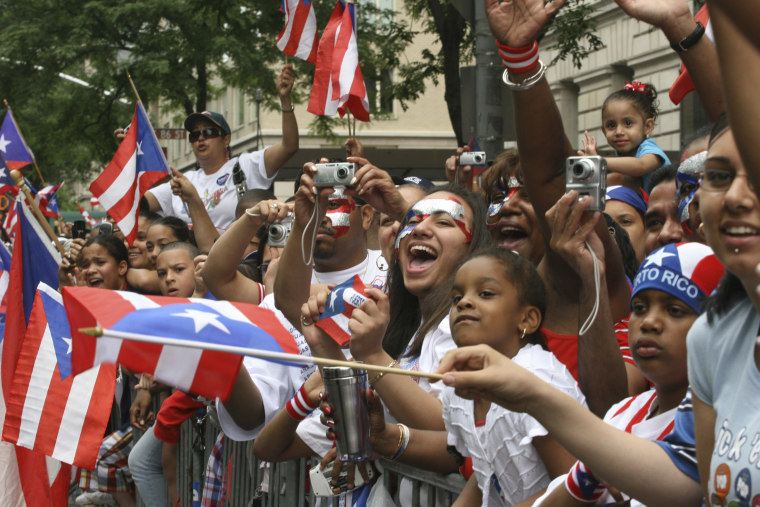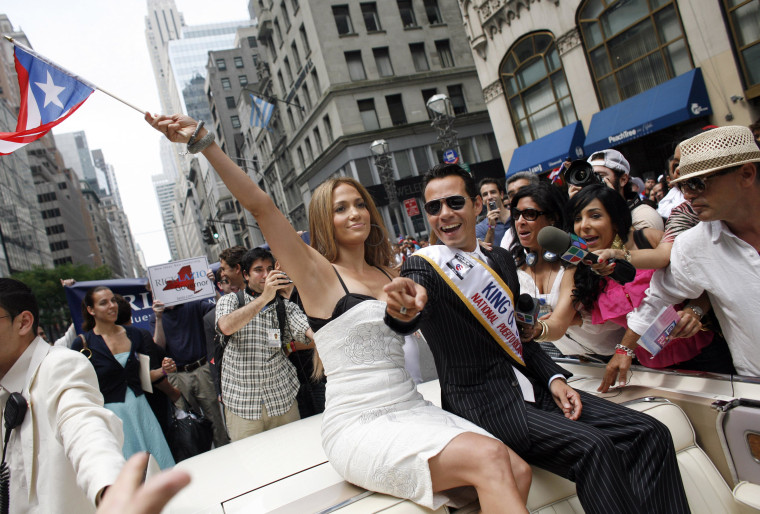NEW YORK — What should be a festive occasion is shaping up as a flash point that is reverberating from New York City to Puerto Rico and impacting an iconic community event.
In what organizers call the largest celebration of cultural pride in the nation, the National Puerto Rican Day Parade will roll up Manhattan’s Fifth Avenue on June 11. Marking its 60th anniversary, the parade’s 2017 theme is Un Pueblo, Muchas Voces (One Nation, Many Voices).
But a decision by the parade board to honor Puerto Rican nationalist Oscar López Rivera, 74, recently freed after serving over 35 years in prison, has sparked controversy. Rivera, whose sentence was commuted by President Obama in January, is a former member of the group FALN, a Spanish acronym for the Armed Forces of National Liberation. In the 1970s and 1980s FALN claimed responsibility for a campaign of bombings in New York City, Chicago, and other cities. In New York City, FALN was linked to the 1975 blast at Fraunces Tavern, which killed four people and wounded many others.

While Rivera was not charged with carrying out any bombings or acts of violence, he served time for sedition, transportation of firearms with intent to commit violent crimes, and transportation of explosives with intent to kill and injure people and to destroy government property.
Organizers of the parade plan to honor Rivera as its first-ever “National Freedom Hero” and have him march at the front of the parade. The parade is also honoring Olympic Gold-medal winner Laurie Hernandez, actor JW Cortes, and others.
But earlier this month, things started to unravel. Goya Foods, which has sponsored the parade every year since it began, pulled out. The company said its move was a “business decision.”
Then this week, more parade sponsors dropped out, including the New York Yankees, Coca-Cola, JetBlue, and AT & T. Some companies indicated that they still intend to contribute to the parade’s scholarships. One of the city's largest newspapers, the New York Daily News, withdrew as a media sponsor, noting in an editorial that though Lopez Rivera wasn't charged with having a direct connection to a bombing, "he proudly oversaw the unrepentantly violent movement."
In a statement, the board of the parade said that they were “saddened and disappointed by certain sponsors pulling out of our Parade,” and that they respected their decision to do so.
Angelo Falcón, a political scientist and co-founder of the National institute for Latino Policy, is not surprised at how controversial this year’s parade has become. “There has been a real miscalculation by the parade board around the Oscar López Rivera issue,” he told NBC Latino. While many people in Puerto Rico and on the U.S. mainland rallied for Rivera’s release, Falcón explained, honoring him at the parade was a different matter.
RELATED: Deep Sorrow Over Orlando Mixes With LGBT Pride at Puerto Rican Day Parade
According to Falcón, some “statehooders” in Puerto Rico began a social media campaign to pressure companies to boycott the parade. “So the parade becomes, in a sense, trapped between the nexus of Latino politics and New York politics and the whole question of Puerto Rico’s status," he said.
The bombing in Manchester, England, is another factor in play. “Americans have little understanding of Puerto Rican history and our political prisoners and role of nationalists,” Falcón said. “Yet without knowing any details, people are quick to condemn anyone labeled a terrorist – and right now, this is an exceptionally sensitive time.”
Some observers see the parade board as perhaps too aligned with New York City Mayor Bill de Blasio and City Council Speaker Melissa Mark-Viverito. In February de Blasio hired the chairperson of the parade as a senior advisor, while Mark-Viverito has long championed Rivera’s cause.
De Blasio, up for re-election this year, intends to march in the parade. “All things considered, I understand why so many Puerto Ricans in this city respect that he (Rivera) fought for Puerto Rico, in their eyes,” he said at a news conference in Queens. “I don’t agree with the way he did it. But he did serve his time.”
However, the New York City Police Commissioner, police associations, and groups representing Latino police officers and firefighters have opted not to march in the parade.

For Jose Prosper, president of the FDNY Hispanic Society, his group’s decision not to join in the parade was not one that they took lightly. “We love the parade. We want to show our Puerto Rican pride, and we want to show our Puerto Rican pride in uniform,” he told NBC Latino. “This is not a political decision, or any kind of dig at Oscar. This is a stance we take against terrorism.”
FDNY Hispanic Society usually has over a hundred members marching in the parade, and sends firetrucks, an ambulance, and other vehicles, Prosper said. The parade is important to their recruiting efforts.
For Prosper, it was important to show solidarity with the NYPD Hispanic Society, a group of Latino police officers, who are also boycotting the parade. “We are not attacking Oscar,” Prosper stressed. “We just do not want to be part of anything that is honoring the group FALN, and he (Rivera) is associated with that group.”
Trying to rally support for the parade, Speaker Mark-Viverito and a group of 35 elected officials released a letter commending the board of the National Puerto Rican Day Parade for recognizing Rivera. “Oscar López Rivera represents the voice, tenacity and resolve of Puerto Rico and its people,” the letter states, and his presence “will lift people’s spirits and bring attention to the challenges that must be immediately addressed on the Island.”
Multiple efforts by NBC Latino to contact several of the letter's signers were unsuccessful.
For de Blasio and other elected officials, the Puerto Rican Day parade is an important stop on the campaign trail. According to the Pew Research Center, the two counties with the largest concentration of Puerto Ricans in the mainland U.S. are both in New York City.
Not all politicians are on board with the parade. New York State Assemblywoman Nicole Malliotakis, a Republican who is running for mayor, will be skipping the event. “I know I will be missing an opportunity to meet people from across the city, but to me it is a matter of principle,” she told NBC Latino. “An organization that sponsored these kinds of terrorist acts should not be highlighted at the parade.”
Malliotakis, who is of Cuban and Greek heritage, believes that the parade organizers have made a mistake. “Rivera is a very inappropriate choice for them to honor, especially since there are so many other people they could have chosen,” she said.
The parade is no stranger to bad press. After an investigation by New York Attorney General Eric Schneiderman into alleged financial mismanagement in 2014, the parade replaced its board, clearing the way for the current leadership. In 2000, several young men were arrested in connection with a string of alleged sexual assaults in Central Park following the parade.
This year, the outcry over the parade has even extended to Puerto Rico. A plebiscite on Puerto Rico’s status — a nonbinding referendum on where Puerto Ricans favor pushing for statehood, the current commonwealth status or independence — will be held on the island on the same day as the parade.
In Puerto Rico, Oscar López Rivera has become the center of two competing narratives, says Harry Franqui-Rivera, board member of the Center for Latin American, Caribbean and Latino Studies at the City University of New York Graduate Center. “There is one myth demonizing him as a terrorist, and another one lionizing him as a national hero,” Franqui-Rivera told NBC Latino.
In Puerto Rico, some who favor independence have seized upon Rivera as symbol of their movement, which has led many of those who favor statehood to denounce him.
Franqui-Rivera said that the parade board should have recognized how contentious their decision would be. “This parade issue is dividing Puerto Ricans; my Facebook page looks like a civil war.”
“It was a political gesture to honor Rivera,” he added, “and now they’re getting the political fallout.”
Still, Franqui-Rivera sees an upside in that the exodus of sponsorship could return the parade to its roots as a community and cultural celebration, as opposed to a marketing event.
Howard Jordan, attorney and professor at Hostos Community College, sees the controversy as illustrative of the lack of understanding of the Puerto Rican experience by other Americans. “People don’t understand that Oscar was, essentially, a reflection of the oppression of the Puerto Rican community here on the mainland and on the island,” he said. López Rivera is a former community organizer and a U.S. veteran with a Bronze Star, but that is rarely mentioned in mainstream press accounts, Jordan said.
Because many people, including a younger generation of people of Puerto Rican descent, know little about López Rivera, Jordan observed, the media can frame him any way that they want.
In Jordan’s view, the parade has always been political and lately, increasingly, “corporatized.” If the parade’s board were seen as more legitimate and transparent, Jordan says, it would be easier for them to rally support directly from the community.
Yet Jordan believes the parade will still go on and be successful, though perhaps with a different spirit.
“It will be big enough that it does not feel diminished, it just won’t have all the glitz,” he said. “That’s fine with me. This controversy has awakened a level of consciousness in our community about what is going on.”
